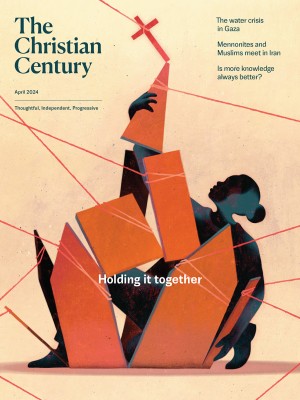Too old to be president?
Critics of Biden’s memory slips fail to mention any of the positive traits associated with aging.

(Century illustration)
In February, Robert Hur determined that no criminal charges should be brought against President Biden for retaining and sharing classified documents as a private citizen. The special counsel also wrote this: “Mr. Biden would likely present himself to a jury, as he did during our interview of him, as a sympathetic, well-meaning, elderly man with a poor memory.”
The White House was furious that Hur shifted focus from the lack of evidence against the president to his alleged cognitive decline, based on what the administration called “a commonplace occurrence among witnesses: a lack of recall of years-old events.” At a press conference, Biden said, “My memory is fine.” Then, in response to an impromptu question about Gaza, he referred to Egyptian president Abdel Fattah el-Sisi as the president of Mexico.
Read our latest issue or browse back issues.
In the days that followed, headlines focused on Biden’s memory lapses. Hur’s comments drew attention to a concern already shared by an overwhelming majority of Americans. According to a recent ABC News/Ipsos poll, 86 percent of respondents think Biden, 81, is too old to serve another term as president. (Sixty-two percent think Donald Trump, 77, is also too old to serve.)
This widespread concern might help explain Biden’s low approval ratings within his own party. But his first-term accomplishments include low unemployment, reduced prescription drug prices, the Infrastructure Investment and Jobs Act, and the CHIPS and Science Act. His record doesn’t tell a story of an inability to govern. Nor is there evidence—which would likely come in the form of media leaks from administration staff—that Biden is struggling behind closed doors with the job’s demands.
It’s true that as we age we are more likely to flub names and dates and that the brain takes longer to process information for snap decisions. As neurologist Zaldy Tan told NPR, that’s a problem for a pilot but less so for an executive. What’s more, multiple studies have shown that cumulative knowledge and experiential skills can be well maintained into advanced age—and that aging can also bring positive cognitive changes. Older adults have learned from their years of accumulated knowledge and experience, something we should keep in mind as Americans remain in the workforce for decades longer than was once expected.
In leadership positions, advanced age can be a genuine asset. Older leaders have had the chance to develop a nose for making sense of complexity, to learn to spot the difference between important and unimportant ideas. They are more likely to have the good judgment and practical know-how that comes with extensive experience. They may take more time to come to a decision, but that decision is more likely to be the right one. They have had time to learn how to surround themselves with wise people, the time to become wise themselves.
Writer Marilynne Robinson, 80, told the New York Times she considers it “a kind of good fortune” that Biden, “someone with a strong institutional memory, who knows how things are supposed to work, who was habituated to their appropriate functioning, is president.” She said she considers him “a gift of God. All 81 years of him.”



